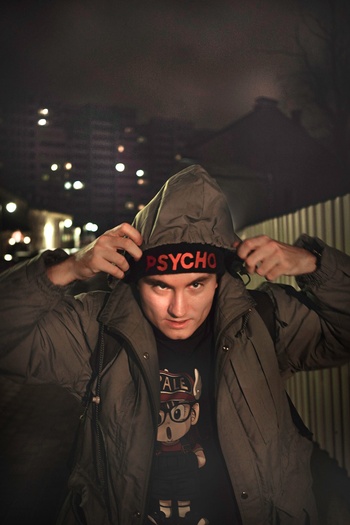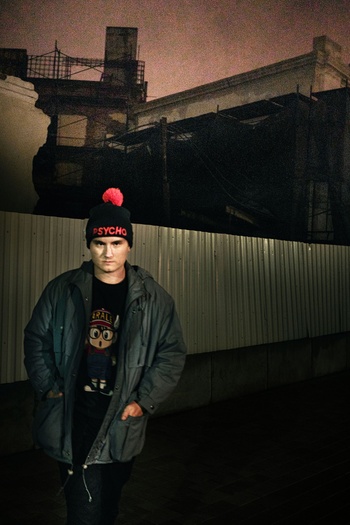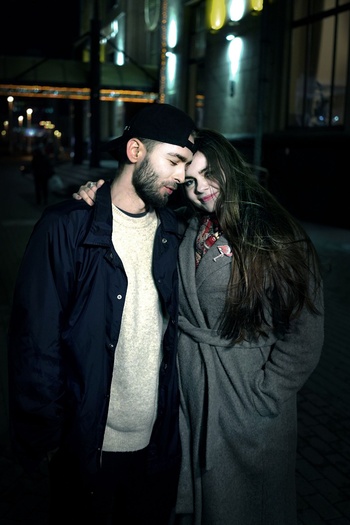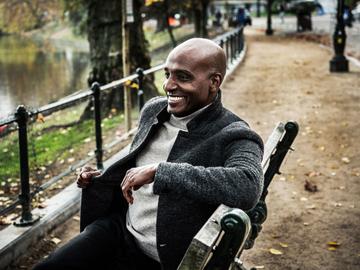The last dictatorship in Europe, the only European country without a film fund, Belarus nonetheless produces fine examples of independent cinema. BRUZZ spent four days at the Minsk film festival to unravel the mystery. We interviewed three young talents whose bold generational films will be screened at Bozar as part of the Bridges festival.
© Sophie-Soukias
Bridges: East of West Film Days
- A five-day festival devoted to the countries on the Eastern border of Europe: Georgia, Ukraine, Armenia, Azerbaijan, Moldavia, and Belarus
- The ex-Soviet bloc produces many cinematic gems, the quality of which has gone unnoticed by international festivals
- Selected highlights: Atlantis (Ukraine, 22/1), My Father Is My Mother's Brother (Ukraine, 25/1), The Criminal Man (Georgia, 23/1), Negative Numbers (Georgia, 25/1)
"What's the word in English for something that's hopeless and fucked up at the same time? Belarusian cinema is hopeless because it is fucked up. Cinema konchenyy,” says Nikita Lavretski, smiling before taking another sip of his Delta IPA made by the Brussels Beer Project. This trendy bar in the centre of Minsk is definitely not the place for fans of Soviet exoticism. This year, the twenty-five-year old filmmaker, the enfant terrible of Belarusian cinema, will present his third feature-length film Sasha's Hell at the international 'Listapad' festival in Minsk, the biggest film festival in Belarus. His first, Belarusian Psycho, won the Best Belarusian Film award in 2015.
From the start, Lavretski, who was headed for a career in IT before he made a 180-degree turn towards cinema, has specialised in films with little to no budget, experimental and tortured films in which the young prodigy employs an original and intensely personal style, inspired by the trashiness of VHS videos and the parallel, sometimes dark, realities of the web. “Belarus is the only country in Europe without a film fund. No movies are funded besides state studio films promoting the army or the police. Crowdfunding doesn't work because people aren't rich enough and the law makes co-productions impossible. Since there's no money, my idea is to make fucked-up movies, movies that wouldn't get funded anyway. I believe we can turn this situation to our advantage.”
I have all my hard-drives hidden during the festival. That's what the political reality looks like here
Claustrophobia
In Sasha's Hell, Lavretski immerses himself in the life of Sasha, a young computer programmer living in Minsk who is preparing himself for a visit from Oli, a musician from Brussels (played by Vlad Lullaby, a Belgian goth rapper recruited via Instagram) who he met on the anonymous and controversial forum 4Chan. The chronicle of a missed opportunity, Sasha and Oli, who were meant to meet up in the real world to bring their virtual musical projects to life, discover that they are more different than they had thought. That painful realisation escalates Sasha's withdrawal into himself. To the point of destruction.
“We never really look inside Sasha's soul. We never quite get what his problem is. He wants to escape reality. Maybe it is the political reality, maybe it is his own reality,” says Lavretski. “I relate to Sasha, I know what it is to not feel connected to anybody and having nobody notice you are suffering.” That revelation seems to be echoed by the young filmmaker's bobble hat with the letters p-s-y-c-h-o printed in blood red, at once a trademark of his own troubled films and an ironic device for repelling evil while also evoking it.

© Sophie-Soukias
| Nikita Lavretski, whose film 'Sasha's Hell' is being screened at Bozar.
It was also via 4Chan that Lavretski met his co-script writer, a Mexico-based writer with whom he has maintained a virtual relationship since 2012 based on exchanges about literature and film. “Sometimes I feel that I am more an internet citizen than a Belarusian citizen,” says the filmmaker whose next film, Nikita Lavretski, an autobiographical collage made up of family and personal archives, filmed in the style of a horror film, is available exclusively on the YouTube channel.
No more myths
“It is not important anymore to escape Belarus when you have the internet,” says Lavretski. “On the other hand, living in Belarus is kind of tough and claustrophobic.” In Sasha's Hell, Alexander Lukashenko's dictatorship is kept at a distance, but it is no less palpable. For instance, when the character Oli, slumped in front of a television set, ridicules the President of Belarus and the KGB as Sasha looks on in shock. “To be completely honest with you, I have all my hard-drives hidden during the festival,” says the filmmaker, showing us a photograph of the huge Stalinist-style intelligence services building – the largest building in Minsk – that he has googled on his smartphone. “That's what the political reality looks like.”
The Minsk film festival is partly funded by the state and supported by Alexander Lukashenko (the printed catalogue for the event opens with a welcoming message from the President). Its national competition includes both independent auteur films and films produced by the Belarusfilm Studios, a state-run national body.

© Sophie-Soukias
| Walking through the streets of Minsk with filmmaker Nikita Lavretski
“There is an increasing demand among Belarusians for more realistic films and characters with whom they can identify, not more myths about the state supplied by the state. They prefer cinema that is cheap but honest,” explains the director of programming for the festival, Igor Sukmanov, before telling us that he estimates that he has 95% freedom of choice and that state censorship affected no more than 5% of the films that were submitted. As a result, the selection is resolutely progressive and aimed at cinema lovers, with, in the international section, triumphs of auteur cinema such as Portrait de la Jeune Fille en feu (Céline Sciamma) and our own source of national pride, De Patrick (Tim Mielants).
Tour de force
“Belarus is a very curious place,” says film-maker Vlada Senkova. “If you take North Korea, they don't have the internet and they have their way of understanding life according to what they are taught. We have the internet, our nation is European-oriented, it is easy to get a visa for Europe, but we have a crazy and weird dictator. It's very contradictory.” Sitting in the lobby of the impressive Hotel Minsk, where guests of the festival stay, the Stalinist classicist architecture of the building, which was built in 1959, the endless corridors and the high ceilings from which opulent chandeliers are hanging, plunge us, like a film set, into the country's Soviet past.

© Sophie-Soukias
| Collaborators Aliaksandr Lesko and Vlada Senkova before the Hotel Minsk.
“We have a president who has ruled the country for twenty-five years and it is time to do something. But I fear that, if a revolution happened, it would come with violence and bloodshed,” continues the filmmaker who, after graduating from the Minsk film school in 2013, chose to continue her studies in Poland. “The demonstrations in Poland made such an impression on me. People were standing in front of the government building shouting for the leader of the country to go away. If you did the same here in Belarus, you would go to prison. People here are arrested and even beaten.”
“Personally, I'm afraid to go into the streets, but I can do cinema,” says Senkova. In 2016, her feature-length film The Count in Oranges made it into the Moscow International Film Festival. In 2019, when UNESCO approached the young woman and asked her to make a video with a social message about the discrimination faced by HIV carriers in Belarus, Senkova and her team succeeded in making an incredible tour de force. “Funding happens very rarely in Belarus, so we decided this was our chance to make a movie.” After six days and six nights of tireless work, II was created.
Personally, I'm afraid to go into the streets, but I can do cinema
In this sixty-minute fictional film with delicate images and intense circular sequence-shots, two adolescents who go to the same school, the timid Sasha and the pretty and confident Nastya, are violently rejected for being different and confronted with the worst misconceptions and beliefs about HIV and homosexuality. But they are not alone in their despair. Their strength and resilience symbolise the winds of change that are blowing over the country. “The generation of the internet, YouTube, Snapchat, and so on, may seem less wise and to have less knowledge from school but actually they understand life better,” says Senkova.
“It feels strange that we are still dealing with LGBT violence and stigmatisation in 2020,” says Aliaksandr Lesko, who has just joined us. A co-writer of II, his own personal experience of being bullied at school as an adolescent inspired the screenplay. “In our post-Soviet countries, there are a lot of people whose voices are very silent and very lonely, and I wanted those voices to be louder,” says Lesko, before delivering, without realising it, a poetic and powerful conclusion to four days of reporting at the Minsk film festival. “Cinema is the best weapon because you can't kill anyone with it but you can change their minds.”
The trailer of 'Sasha's Hell' by Nikita Lavretski
The trailer of 'II" by Vlada Senkova




Fijn dat je wil reageren. Wie reageert, gaat akkoord met onze huisregels. Hoe reageren via Disqus? Een woordje uitleg.